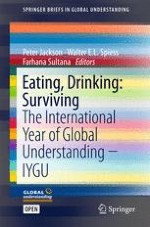
Open Access 2016 | OriginalPaper | Buchkapitel
Moral Economies of Food in the Socialist/Post-socialist World
verfasst von : Marisa Wilson
Erschienen in: Eating, Drinking: Surviving
Aktivieren Sie unsere intelligente Suche, um passende Fachinhalte oder Patente zu finden.
Wählen Sie Textabschnitte aus um mit Künstlicher Intelligenz passenden Patente zu finden. powered by
Markieren Sie Textabschnitte, um KI-gestützt weitere passende Inhalte zu finden. powered by